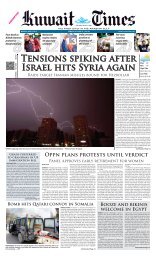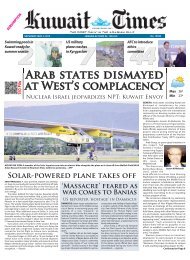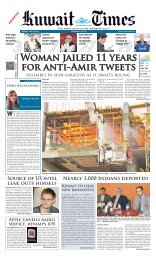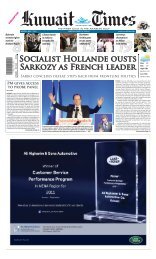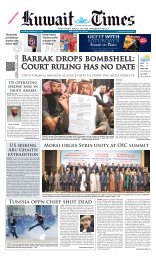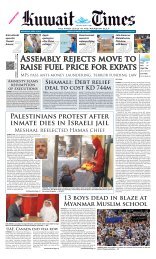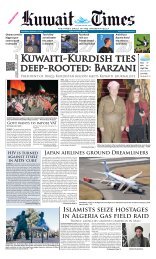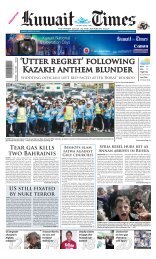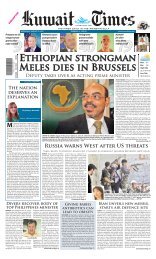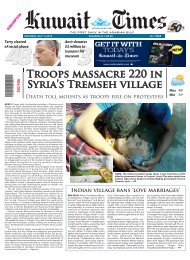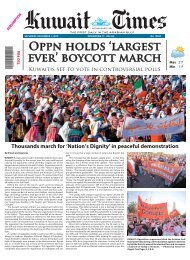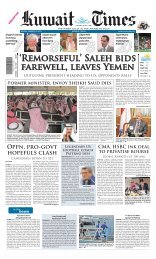otics may lead to future antibiotic-resistant infec - Kuwait Times
otics may lead to future antibiotic-resistant infec - Kuwait Times
otics may lead to future antibiotic-resistant infec - Kuwait Times
You also want an ePaper? Increase the reach of your titles
YUMPU automatically turns print PDFs into web optimized ePapers that Google loves.
FRIDAY, MARCH 16, 2012<br />
By Joseph May<strong>to</strong>n<br />
Rushing from one telephone call <strong>to</strong><br />
another, Bothaina Kamel casually <strong>to</strong>sses<br />
her hair, as she answers questions from<br />
incoming callers. She radiates a winning combination<br />
of softness and power that in many<br />
countries give her nothing less than a knockout<br />
punch for politics. But here in Egypt, the<br />
quick moving and energetic Kamel is facing<br />
an uphill battle since she announced her<br />
intention <strong>to</strong> run for Egypt’s <strong>to</strong>p job last year. “I<br />
want <strong>to</strong> help bring change <strong>to</strong> Egypt. That is it.<br />
And I can do it,” she says, taking a moment <strong>to</strong><br />
sip a hot drink from a glass at her headquarters<br />
in central Cairo. She <strong>to</strong>ld The Media Line<br />
she doesn’t have time for pomp and circumstance.<br />
“Leave that <strong>to</strong> the men. I’m here <strong>to</strong><br />
make a better country,” she says, grabbing<br />
another incoming call, getting updates from a<br />
march only a few blocks away. “It’s time <strong>to</strong><br />
go,” she says and quickly shakes hands and<br />
jolts out of the room. Off <strong>to</strong> the barricades.<br />
Kamel is no stranger <strong>to</strong> the frontlines of<br />
protests, having been there in November for<br />
the clashes on Mohamed Mahmoud Street in<br />
central Cairo, then again less than a month<br />
later when the military junta attacked a sit-in<br />
at the cabinet building. In February, Kamel<br />
was present, showing solidarity and support<br />
for whom she calls “my fellow Egyptian fighters”<br />
when clashes erupted near the Ministry<br />
of Interior. She has been detained, beaten and<br />
arrested by the country’s military. She has featured<br />
in international media and has earned<br />
the support she has through attending<br />
protests, speaking <strong>to</strong> people in villages and<br />
working for grassroots change in Egypt,<br />
unlike any of the other candidates who have<br />
nominated themselves.<br />
The nomination expected <strong>to</strong> create a field<br />
of about 10 or so serious contenders for the<br />
office when voters go <strong>to</strong> the polls at the end<br />
of May. Even though the revolution that led<br />
<strong>to</strong> elections brought an end <strong>to</strong> Hosni<br />
Mubarak’s rule, the front-running candidates<br />
in fact are holdovers from the old regime. Amr<br />
Moussa was head of the Arab League and foreign<br />
minister under Mubarak. Mansour<br />
Hassan was a minister under Anwar Sadat,<br />
Mubarak’s predecessor, and Ahmed Shafiq, a<br />
former air force commander who appointed<br />
by prime minister in the final days of<br />
Mubarak’s rule. Others are Islamists like Abdel<br />
Moneim Aboul Fo<strong>to</strong>uh, a former member of<br />
the Muslim Brotherhood, and Hazem Salah<br />
Abu Ismail, a prominent Salafist.<br />
Still, with less than three months until<br />
Egyptians take <strong>to</strong> the polls <strong>to</strong> elect a new<br />
president, most average Egyptians have never<br />
even heard of her. “Bothaina who?” they ask.<br />
When <strong>to</strong>ld she is the woman who hosted a<br />
call-in talk show a number of years back <strong>to</strong><br />
assist women with personal issues, sometimes<br />
a light bulb goes off in recognition. “But she’s<br />
running for president?” asks Mariam, a 47year-old<br />
mother of four and housewife in the<br />
Garden City neighborhood of Cairo. For her,<br />
Kamel is not a politician, but a talk show host.<br />
Nothing more. Apparently, the local press<br />
tends <strong>to</strong> agree with Mariam. In the past few<br />
months, not a single Arabic newspaper has<br />
mentioned Kamel as a candidate for the presidency.<br />
When her name comes up in their s<strong>to</strong>ries,<br />
she is called an “activist”. Kamel insists<br />
that she isn’t bothered by this. “My supporters<br />
are growing and I believe in my mission.<br />
Maybe I won’t win this time, but it is important<br />
for women <strong>to</strong> be out there,” she added in<br />
a later phone conversation.<br />
A television host and activist for most of<br />
her adult life, Kamel was born in 1962 and<br />
graduated from Cairo University in 1983,<br />
where she was active in the student union.<br />
Although she has long been part of the media<br />
establishment - anchoring a radio program<br />
Opinion<br />
Kamel’s lonely quest<br />
for Egypt’s <strong>to</strong>p job<br />
The country’s only woman candidate for president can’t get the media’s attention<br />
Egypt’s first female presidential hopeful Bothaina Kamel is seen after she<br />
registered her name for the upcoming presidential elections in Cairo on<br />
March 11, 2012. - AP<br />
called “Midnight Confessions”, working as a<br />
presenter for the Egyptian state television and<br />
hosting the hit show “Please Understand Me”<br />
on the Saudi-owned satellite TV channel Orbit<br />
- she has long been indentified as a prodemocracy<br />
advocate and for repeated conflicts<br />
with the authorities. But being a woman<br />
is not enough <strong>to</strong> get elected. Leading<br />
women’s rights advocates in the country,<br />
including Nawal Saadawi, have been apprehensive<br />
about throwing their support behind<br />
a female candidate simply because she is a<br />
woman. “I must know her program before I<br />
can support her,” Saadawi <strong>to</strong>ld The Media<br />
Line.<br />
This month, however, ahead of the official<br />
nomination period, which began on March 10<br />
and runs through April 8, Kamel issued a briefing<br />
on her campaign’s platform. It was a daring<br />
move because it was something her male<br />
counterparts have refrained from doing, preferring<br />
<strong>to</strong> refer <strong>to</strong> justice, freedom and<br />
democracy than actually talking about their<br />
platforms. She talks about a minimum wage,<br />
rule of law, separation of religion and state,<br />
and a civil society based on a constitution. At<br />
a recent public talk, she spoke candidly about<br />
the role of her candidacy as a means of boosting<br />
female participation in Egypt’s <strong>future</strong>.<br />
nevertheless, she concedes that her country’s<br />
transition <strong>to</strong> democracy will be difficult.<br />
Kamel says that while she opposed<br />
Mubarak’s regime, she never imagined that<br />
the revolution would occur as it did but warns<br />
that it has yet <strong>to</strong> achieve all its goals. “The revolution<br />
did s<strong>to</strong>p, however, the planned succession<br />
of power,” she says, referring <strong>to</strong> the<br />
military’s takeover of power last February,<br />
which removed the threat of Mubarak’s son<br />
taking over. Still, the media rarely cover her<br />
events, and when they do they are often condescending<br />
<strong>to</strong> her as a female candidate,<br />
often referring <strong>to</strong> her dress and appearance<br />
instead of the substance of her remarks.<br />
An assistant edi<strong>to</strong>r at a <strong>lead</strong>ing Arabic daily,<br />
who asked not <strong>to</strong> be named due <strong>to</strong> the<br />
sensitivity of his comments, <strong>to</strong>ld The Media<br />
Line that this is the policy within the old<br />
guard of newspapers. “Women have traditionally<br />
- and are still <strong>to</strong>day -considered <strong>to</strong> be<br />
wives and mothers first. So when there is any<br />
coverage of women in the political sphere,<br />
there are ways of reporting it so they don’t<br />
get the credibility they deserve,” the edi<strong>to</strong>r<br />
explains. For this <strong>to</strong> change, “the local and<br />
independent media must step in <strong>to</strong> fill these<br />
gaps. The people at the <strong>to</strong>p in most Arabic<br />
newspapers are older men and they don’t like<br />
<strong>to</strong> be stepped on, especially by influential and<br />
powerful women.” That’s where Kamel’s candidacy<br />
will be instrumental in changing attitudes,<br />
she believes. “We can only do as much<br />
as we are capable of doing and if it helps <strong>to</strong><br />
change a few peoples’ ideas about women<br />
and government then that’s great. I will keep<br />
fighting for what is right no matter what.”<br />
Even if the media fail <strong>to</strong> give her the ink she<br />
deserves. - Media Line



